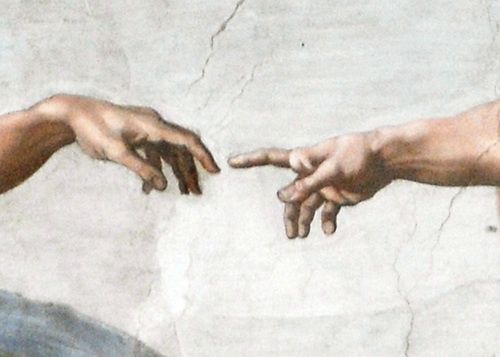Wooed and Pursued!

“Woo”--who says that, and what does it even mean? Often used in poetic contexts, “woo” carries the idea of appealing to someone’s needs to “win their heart.” So how does this idea apply to God, His Word, and us, for that matter? In Acts 17:22-34, the Apostle Paul--given an audience in the pagan city of Athens--provides a perfect example of how to be an apologist in a “woo-some” way. In fact, here’s a Reasons for Hope 60-second video showing how he did this.
Paul connected with his audience on their “turf,” referenced their beliefs to show that he understood them, and transitioned into a message of truth that appealed to their needs; i.e., he wooed them into a paradigm shift and was able to show them a much better way. In verses 26 and 27 of this passage, Paul announces to the Athenians that they were created by the One True God Who made them to “seek the Lord.” When I read this passage, I was reminded of something I heard as a child--that in every human is a “God-shaped vacuum” that only He can fill.
In the next section of this blog, one of our speakers, Dr. Juan Valdes, takes us on a deep dive into this idea through the work of one of his favorite authors, C.S. Lewis:
“The Irresistible and the Indisputable are the two weapons which the very nature of His scheme forbids Him to use. Merely to override a human will … would be for Him useless. He cannot ravish. He can only woo” (Lewis, The Screwtape Letters, 46; Geisler, 99).
C. S. Lewis presents a picture of God’s pursuit of man as active, aggressive, and complete, yet without force. For Lewis, the pursuit of man revolves primarily around the drawing power of what Jesus Christ did on the cross to redeem us from our sin. In addition, Lewis argues for an internal factor of this pursuit built into man by his Creator (a “God-shaped vacuum,” so to speak).
Christ’s redemptive work is the clearest and most perfect element in God’s plan for attracting man unto himself. The fall of man in the Garden of Eden left him estranged or alienated from God, lost and unable to find his own way back. If man was ever to find his way back to the Father, he needed God’s leadership and direction. Lewis eloquently captures the essence of this dilemma and the mission of Christ when he states that,
“(W)e need God’s help in order to do something which God, in His own nature, never does at all—to surrender, to suffer, to submit, to die. Nothing in God’s nature corresponds to this process at all. So, the one road for which we now need God’s leadership most of all is a road (that) God, in His own nature, has never walked … But (believing) God became man—suppose our human nature which can suffer and die was amalgamated (combined) with God’s nature in one person—then that person could help us” (Lewis, Mere Christianity, Part II, Chapter 4, emphasis and clarification added).
Christ’s redemptive works are the bridge that reconnects man with his estranged Creator. This is clearly the significance of Christ’s famous words, “I am the way, and the truth, and the life; no one comes to the Father but through me” (John 14:6). At the heart of the Gospel we find that God’s pursuit of man was thorough and complete.
- The Son was sent, and all men were given an opportunity (John 3:16-17);
- The way to God was physically demonstrated (John 14:6); and
- Access has been granted to the throne of God (Hebrews 10:19-22).
What we have is definitely not a hi-jacking, but rather a wonderful invitation--a wooing in the true sense of the word.
“If I find in myself a desire which no experience in this world can satisfy, the most probable explanation is that I was made for another world.”
To further enhance the possibilities of success, God implanted in His masterpiece of creation a desire for Him. The argument from desire, that Lewis is so well known for, is itself an element in God’s pursuit of man. Lewis argues that man is born with desires that no earthly pleasure can satisfy and rightly concludes that, “If I find in myself a desire which no experience in this world can satisfy, the most probable explanation is that I was made for another world” (Lewis, Mere Christianity, 121). Thus, Lewis argues that God, in His infinite wisdom, designed us with a need for Him that would facilitate our response to His pursuit.
“God made us: invented us as a man invents an engine. A car is made to run on petrol, and it would not run properly on anything else. Now God designed the human machine to run on Himself. He Himself is the fuel our spirits were designed to burn, or the food our spirits were designed to feed on” (Lewis, Mere Christianity, 53-54).
Written by Dr. Juan Valdes, Reasons for Hope Speaker
God pursues us more fervently and passionately than anyone else ever has, can, or will. His motive, driven by an incomprehensible and incomparable love, is pure and compelling.
Ephesians 3:17-18
And I pray that you, being rooted and established in love,
may . . . grasp how wide and long and high and deep
is the love of Christ.
To learn more about Juan Valdes, or to book him as a speaker, please click HERE.
To find dozens of more resources like the video above, download our FREE APP--Reasons for Hope. (Look for the blue asterisk.)
Recent
Archive
2026
2025
February
March
April
May
June
July
August
November
2024
February
March
April
May
June
July
August
September
November

No Comments